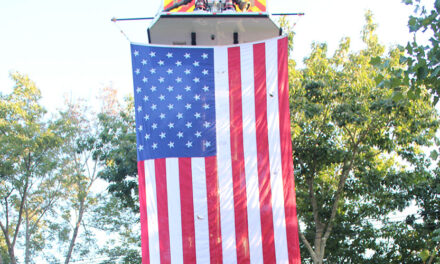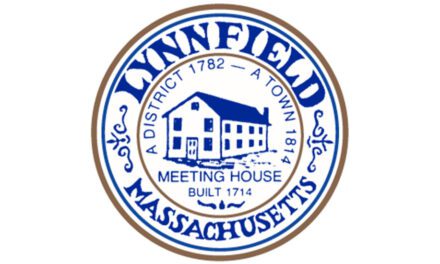Published in the October 28, 2015 edition
TOWN MEETING NOTEBOOK
By MAUREEN DOHERTY
LYNNFIELD — It may have taken an extra six months but changes to the town’s sign bylaws were approved by the voters at October Town Meeting Oct. 19.
Articles 15, 16 and 17, proposed by the Planning Board, had fallen victim to a lack of quorum at the second session of the annual Town Meeting last April. This time around, to ensure that would not happen again, Selectman Chris Barrett requested that these articles be taken out of order and acted upon as the first order of business in the warrant rather than the last.
“These are articles that deal with signage throughout the community and are important to our neighborhoods in the community,” Barrett said, noting that his board agreed with a request made by a neighborhood resident at a prior board meeting to request that they be taken out of order.
Selectman Tom Terranova stated he supported Barrett’s motion. “This has been an ongoing issue. The people in that area of Lynnfield have been enduring a lot issues with the changing of Route 1 and the possible CVS,” in addition to a variety of signage issues, he said.
“I am hopeful that everybody will support Selectman Barrett’s motion,” Terranova added. It required a 4/5ths vote to take these articles out of order, which was done unanimously.
The voters then passed Article 15, which amends the Zoning Bylaw by adding Section 6.8: “Standards Applicable in All Districts.” It states: “The sections on sign regulations are intended to ensure that all signs are located, designed, sized, constructed, installed and maintained in a way that protects and promotes safety, health, aesthetics and the public welfare including impact upon residential property value while allowing adequate communication. Signs shall neither contain moving elements nor convey the appearance of movement, whether by changing pixilation or any other physical or electronic representation of movement.”
MarketStreet exemption
Selectmen Chairman Phil Crawford stated his board supported passage of Article 15. “One of the issues that came up last year was whether or not it pertained to the MarketStreet 40R district and we were assured that this does not. We conferred with town counsel and even though it says ‘all districts,’ it doesn’t apply to a 40R district,” Crawford said.
Town Counsel Tom Mullen explained that it would not apply to the Chapter 40R district that governs MarketStreet because the zoning changes that allowed MarketStreet to be developed were approved by the state Department of Housing and Community Development (DHCD). Therefore any changes to that zoning would also require approval by DHCD.
However, the 40R district has its own regulations on signage that are considered to be more restrictive than the existing regulations covering the rest of the town. Adoption of this article was designed to give the rest of the town similar protections from obtrusive signage.
Both Planning Board co-chairman Alan Dresios and Finance Committee chairman Jack Dahlstedt said their respective boards recommended passage.
Article 16 was also recommended unanimously by all three boards. It amends the definition of a sign under Section 2 of the town’s zoning bylaw to conform with the state definition. Dresios said it was taken “verbatim” from the state building code.
It defines a sign as “any letter, figure character, mark, plane, point, marquee sign, design, poster, pictorial, picture, stroke, stripe, line, trademark, reading matter or illuminated surface which shall be constructed, placed, attached, painted, erected, fastened or manufactured in any manner whatsoever, so that the same shall be used for the attraction of the public to any place, subject, person, firm, corporation, public performance, article, machine or merchandise, whatsoever, which is displayed in any manner outdoors, including any from the foregoing which may be visible in any manner from the outdoors.”
Wallace McKenzie, 6 Debston Lane, requested clarification on why MarketStreet is exempted from changes to the town’s Zoning Bylaw under Articles 15, 16 and 17.
Mullen explained that “MarketStreet is subject to Ch. 40R, which means that there has to be a separate section in our Zoning Bylaw dedicated just to that zoning district.”
Under Section 9.5, “Nothing outside of Section 9.5 has any impact on anything in the 40R district. Only the text within 9.5 itself applies to the 40R district, which is MarketStreet,” Mullen said. He added the town had not sought approval by DHCD “because we don’t regard it as applying to MarketStreet.”
McKenzie followed up by stating he wanted to know why the planning board or selectmen did not require MarketStreet to “conform to the same regulations as everywhere else in town.”
Dresios concurred with Mullen that DCHD would have to be involved in any tweaking of Section 9.5. “We did not choose to seek that. This article on the definition of a sign is from the state building code and therefore it already is applied to MarketStreet under the building code regulations,” he said.
Dresios added that code enforcement is up to the building inspector and this article is an attempt by the Planning Board to “clear our zoning bylaw up.”
McKenzie asked whether Mullen agreed that Articles 15, 16 and 17 “apply to MarketStreet under the state building code.”
Mullen said, “I agree that the state building code applies to all construction throughout the state. Whether the language in Article 16 is the same as appears in the state building code, I don’t know.”
Drones not included
Harry LeCours, 25 Partridge Ln. asked if the Article 16 “as written would pertain to drones.” He has noted an “increasing use of drones,” which he said are sometimes used “for advertising purposes.”
Mullen said it would not apply to drones because Article 16 is “proposed to be part of the zoning bylaw having to do with the use of land, in order for this definition of a sign to apply it has got to be a physical object that is tied to or associated with or used on a parcel of land.”
LeCours favored broadening the sign definition in the future to include some type of regulation of drones in the future.
Town Moderator Arthur Bourque assured one woman that passage of the sign bylaw amendments would not eliminate or limit the temporary yard sale signs seen around town.
Article 17 also passed unanimously as an addition to Section 2 in the ZBL that deals with definitions, tense and construction, precedence and specific definitions and missing definitions related to signs.
Also at Town Meeting
All other articles on the warrant, with the exception of Article 4, were passed by the voters. As reported by the Villager last week, the request to expand the current Board of Selectmen from three members to five by amending the Town Charter under Article 4 through a citizens’ petition sponsored by Selectman Tom Terranova failed 318-109.
At the outset of Town Meeting, Town Moderator Arthur Bourque asked those in attendance to offer a moment of silence in memory of Carol Drislane, the wife of former Selectman Dave Drislane, who died Oct. 15 and who was being waked that evening.
Articles 1 and 2 were passed to balance the town’s books. Article 1 allows bills that arrived after the close of FY’15 on June 30 totaling $2,591 to be paid. The largest bill was $2,400 for appraisal services.
Under Article 2, voters approved the transfer of $307,130 between accounts in the current fiscal year to balance the books. Doing so allows the town to raise and appropriate $136,658; to transfer $70,000 from certified free cash to the general fund; and to transfer $100,472 from existing FY’16 appropriations to other accounts within the FY’16 budget.
• Article 3: Voters agreed to raise and appropriate or transfer from available funds $200,000 into the Other Post Employment Benefits (OPED) Liability Trust Fund.
• Article 5 established a revolving fund for the Department of Public Works (DPW) to pay expenses “related to maintenance and upkeep of athletic fields for the fiscal year commencing July 2015.” This fund would be credited with all “field maintenance fees and charges received during the current fiscal year for field use.”
Andy Youngren asked how much money would be in the pool of funds collected through recreation fees and if the article did not pass, what would happen to the fees being collected.
Town Administrator Jim Boudreau said the town “anticipates about $49,000 would be in the maintenance fund this fiscal year. If this (revolving) account is not set up, it will remain in the Recreation account and will be segregated and it would be moved at a later date.” He explained that these fees are being collected in addition to funds the town currently contributes to the DPW account toward field maintenance, not in lieu of those funds.
Recreation Chairman Matt Monkiewicz said it is important that his committee gets field “maintenance taken care of by DPW over and above what has been done in the past, specifically, soccer and baseball (leagues) have been paying private contractors each year upward of $10,000, $15,000 or $20,000 per league. They’re now paying fees to Rec, so I think we need to solve this here.”
Monkiewicz said his amendment made on the floor covered the Recreation board’s concern that an agreement be established between his board and the DPW on the specifics of the work to be done by the DPW “before any of the funds are released.” He added, “We cannot expect these leagues that are now paying these fees to continue the maintenance.” The voters agreed and passed both his amendment and the establishment of the revolving account.
• Article 6: Similarly, the voters agreed to establish a recreation capital trust stabilization fund for “large and/or long-term capital projects, improvements and turf replacement to the town’s synthetic turf fields.”
• Article 7, seeking $5,000 to pay outstanding medical bills for firefighter Kim Diorio McGonnell, who was injured in the line of duty in April 2013, was passed by the voters. It would be funded from free cash. McGonnell will be retiring from the force.
• Article 8 was passed to adopt MGL Ch. 41, Section 110A to allow any public office in town to remain closed on “any or all Saturdays” as if it was a legal holiday. Selectmen Chairman Phil Crawford passing the article simply means when a legal deadline falls on a Saturday it will allow the town to push it to Monday or the next legal business day rather than being required to open Town Hall.
• Article 9 was passed to revise the dog licensing fees in the town’s general bylaws to $10 for neutered males and spayed females and $15 for intact dogs. It also includes a fine of $10 per dog if the fee is not paid by March of each year.
• Article 10 passed to allow the renumbering and recaptioning the town’s General Bylaws under an ongoing rectification process. The final draft of the document, titled “Lynnfield Recodification – Final Draft” was completed in August 2015.
• Articles 11 and 12 both passed and were related to this facilitating the re-codification process.
• Article 14 passed unanimously to adopt a state law enabling the Board of Assessors to grant members of the Mass. National Guard or military reservists who are on active duty and serving in a foreign country a reduction of all or part of their real and personal property taxes. The law allows the assessors to set the percentage of taxes to be reduced each year, from zero to 100 percent.
• Article 18 was another Planning Board sponsored article held over from April 2015. Its passage corrects an error in the town’s zoning bylaw to amend the definition of an acre of land within the groundwater protection district as 40,000 square feet rather than 43,560 square feet.




